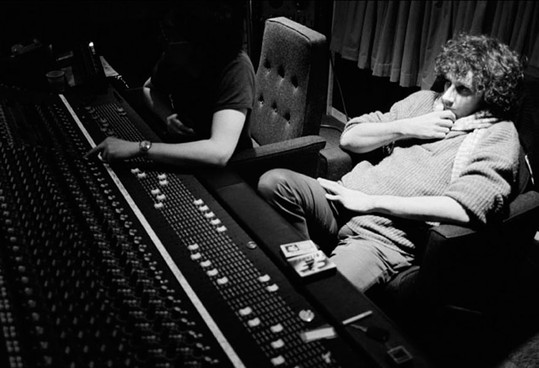We’re back after an extended winter break we’ve been off quaffing champers and repeatedly punching James Cordon in the face, it made us feel a heck of a lot better about that horror show he resided over that was the Brits this week anyway.But we’re back because we have a salient question to ask you? Who are your favourite producers? Producers might often be over shadowed by the artists, but at their best they can act as aural directors, helping shape an album’s sound and feel, setting up and making decisions about the recording technique’s that will be used and often mixing the end results. Steve Albini(Nirvana, Pixies, P J Harvey) known for his stripped back, raw live recording techniques prefers the term ‘mixer’ wanting not to leave a mark on the bands core sound, but then he is still on the back of the sleeve and people still refer to ‘In Untero’ as a Albini record, so maybe he’s fighting a losing battle anyway.
Influential producers like George Martin(The Beatles) , Sam Philips( Elvis) and are credited with revolutionising studio techniques in the 1950s and 60s. Then there’s those producers that define a sound Phil Spector, Joe Meek(Telstar), The Neptunes(Kelis), Conny Plank(Neu!), Timbaland(Jay Z), Dr Dre(Eminem) have that indefinable knack for giving their productions a sonic stamp, often that indefinable thread that runs through records they are involved with. As time has gone on artists have increasingly become involved in the recording and mixing processes, Brian Wilson of the Beach Boys and Marvin Gaye are amongst the key figures in redefining what it means to be a song writer who also exerts their influence upon their own masterpieces. While producers who are also talented musicians in their own right like Eno(Talking Heads), Visconti(Bowie), Wetherall(Primal Scream), Nile Rogers(Chic, Duran Duran, Madonna) and Jim O’ Rouke(Sonic Youth) can almost serve as an additional band members.
For every great producer there’s a smug arsehole(cough cough Mark Ronson) that feels the need to layer his records with 100s of tracks: cramming your ears with jazz trumpets and a productional sheen so thick that it ruins the original recordings, this is called making an album ‘commercially ready.’ But it’s a very fine line between classic pop production of Quincy Jones and Spector and the over the top syrup of albums that little bargain buckets across the land….
Of my own personal favourites here are a quick list of a few:
Andrew Wetherall was one of the new breed, he would probably call himself a remixer thus he was involved in the final mixes of records and particularly a key part in shaping the aural ‘coming up’ that was Primal Scream’s 90s classic fusion of beats and psych- melody ‘Screamadelica’…His key mixes of My Bloody Valentine and New order tracks were also significant!
Learning his craft whilst working on records from John Lennon, Floyd and George Harrison, John Leckie’s magical touch was first in real evidence on the debut single Public Image from post-Sex Pistols formation Public Image Ltd.He also worked on records from The Fall, XTC and Simple Minds.
Leckie was the ‘go-to’ producer and one of my personal favourites throughout the 90s, his work added clarity and flourish to classic debuts from The Stone Roses(yes every time someone says how awful they are live now, proves his work was crucial in that albums success) Elastca, Verve and still my favourite Radiohead album ‘The Bends’ -futuristic yet somehow brutal, experimental and compelling the Bends is a wonderful album….
Phil Spector’s private life may have taken a tragic turn in his latter years but Spector’s ‘Wall of Sound’ is credited with defining a sound that he announced to the world before his 20th birthday with The Teddy Bears’ ‘To Know Him Is To Love Him’. His impressive work stretches from The Ronettes to The Beatles’ ‘Let It Be’, Tina Turner’s ‘River Deep Mountain High’, and John Lennon’s ‘Imagine’. Although many blame his heavy handedness for ruining the Beatles’ ‘Let It Be’ with his sweeps of strings and grand layers opposed to the stripped back recordings, Spector’s work is unmistakable and as influential today as it was back in the 50s and 60s, witness his drum sounds influence upon the likes of the Jesus and Mary Chain, his work with(orginal punks) the Ramones is also worthy of note….
Steve Albini might divide some and maybe his ‘sound’ can be a little stereotypical but he does strip bare many of those he works with, revealing their shivering brutal core. Which is often refreshing when you consider how much some producers fiddle and layer with original recordings and mixes. The most obvious is his work with Nirvana on ‘In Utero’ revealing their rawer live sound, but it is perhaps his work with the Pixies that set this template for no fuss, less is more, recording and mixes:
Quincy Jones’s work with Michael Jackson on the singer’s debut ‘Off the Wall’ is a meeting of creative genius’ both moving in it’s lushious fusion of disco rhythms, vibrant soul melodies and use of deft guided piercing strings , it was arguably one of the first cross over mainstream pop albums from a black artist. Even with his 55 years in the business, his work with John Williams, and multiple grammys this was his finest achievement….
Since working with U2 and Coldplay Brian Eno is now derided as the go to man for mainstream bands who want a fleck of his experimental fairy dust. But that does the man who produced some of Talking Heads and David Bowie’s finest moments a real disservice. Maybe he’s guilty of building his pension pot on his recent productional jobs but his widescreen, malleable and dexterous hand informed by his work with Roxy Music and in electronic music, has guided some glorious glorious moments including Bowie’s ‘Heroes’ and one of the greatest singles of all time…
Martin Hannett is most associated with Joy Division and Factory records, his nascant work on The Durutti Column, A Certain Radio and John Cooper Clark led to his successful relationship with the label . The thing that stands out is his ability to capture Joy Division’s fearsome live sound on their first album ‘Unknown Pleasures’ then craft an album and perfect an enveloping haunting atmosphere on its affecting memorable follow up ‘Closer’. In fact Peter Hook says it was Hannett who was perhaps most crucial to how that album ended up sounding following the untimely death of Joy Divsion singer Ian Curtis when it was half finished….
Rick Rubin perhaps straddles genres most successfully contributing to several songs on the Beastie Boys initial albums he went on to work with progressive metal acts like RATM and System of a Down before reviving the career of one Johnny Cash with a series of covers albums that shone a new light on one of the century’s most memorable voices:




